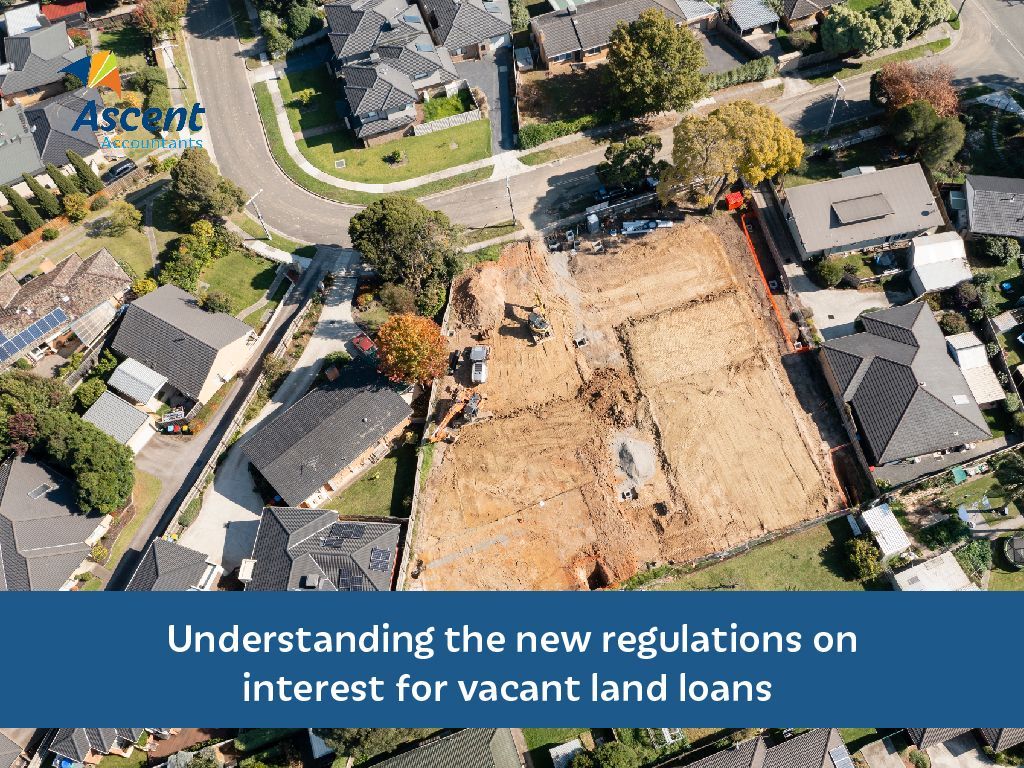Understanding the new regulations on interest for vacant land loans

Before July 2019, loans for vacant land were an attractive avenue for entering the property market. The interest on these loans was deductible, making the overall cost lower for borrowers. This had the potential to yield significant profits once the property was developed and either rented out or sold. However, in July of this year, new regulations came into effect.
In this article, we'll explore how these changes in the law could impact your business and what steps you may need to take.
Defining “vacant land” for tax and legal purposes.
Vacant land, for tax and legal purposes, is defined as land that lacks a substantial and permanent structure during the period of ownership. This classification extends to land containing a substantial and permanent structure if that structure falls into the category of residential premises. In such cases, the residential premises must have been constructed or significantly renovated while the entity held the land.
Additionally, these premises must meet one of two conditions: either they are not yet legally fit for occupancy, or they are legally fit but have not yet been rented out or made available for rent.
Notably, certain purchasers of potential residential land are now obligated to withhold a specific amount from the land's purchase price for payment to the relevant authorities. This ensures compliance with tax regulations and legal requirements in the realm of vacant land transactions.
Interest deductibility post-construction.
Previously, if you held vacant land and took out loans for it, you could deduct the interest accrued on those loans as a business expense. However, the legislation now mandates that interest is only deductible once a structure has been built on the land. This means that keeping land vacant with no immediate development plans has become a more expensive proposition. To mitigate the effects of this change, you'll need to expedite construction on the land. By doing so, you not only make the interest deductible sooner but also start generating revenue from the property at an earlier stage.
The impact on existing properties.
If you already own vacant land and have been deducting interest on loans taken out before the law change, the interest on these loans is no longer deductible until a structure is erected on the land. If you've held vacant land for an extended period without any development, your interest expenses will not be tax-deductible.
If this is you, constructing a building on the land can be a smart strategy to reduce your tax liability and generate income. While there may be initial costs associated with starting construction, this approach can be more profitable in the long run.
Entities that are unaffected by this change.
This change doesn’t impact all entities and taxpayers uniformly. There are certain circumstances in which deductions for expenses associated with holding vacant land remain permissible.
Entities falling within the following categories can continue to claim deductions for expenses related to vacant land ownership: corporate tax entities, superannuation plans (excluding self-managed superannuation funds), managed investment trusts, public unit trusts, and unit trusts or partnerships consisting entirely of members belonging to this specified list. This exemption ensures that those with legitimate business or investment purposes involving vacant land can still access deductions within the bounds of the new regulations.
Consult an expert.
The changes in regulations surrounding interest on vacant land loans have altered the financial landscape for property investors. To navigate these changes effectively, it's advisable to consult experts in tax planning, such as Ascent Accountants.
With years of experience, our expert team can guide you through the shifting legal landscape and help you make informed decisions. If you have any questions or need advice on vacant land loan interest changes, please don't hesitate to contact us. We're here to help you make the most of your investments.
Need help with your accounting?








